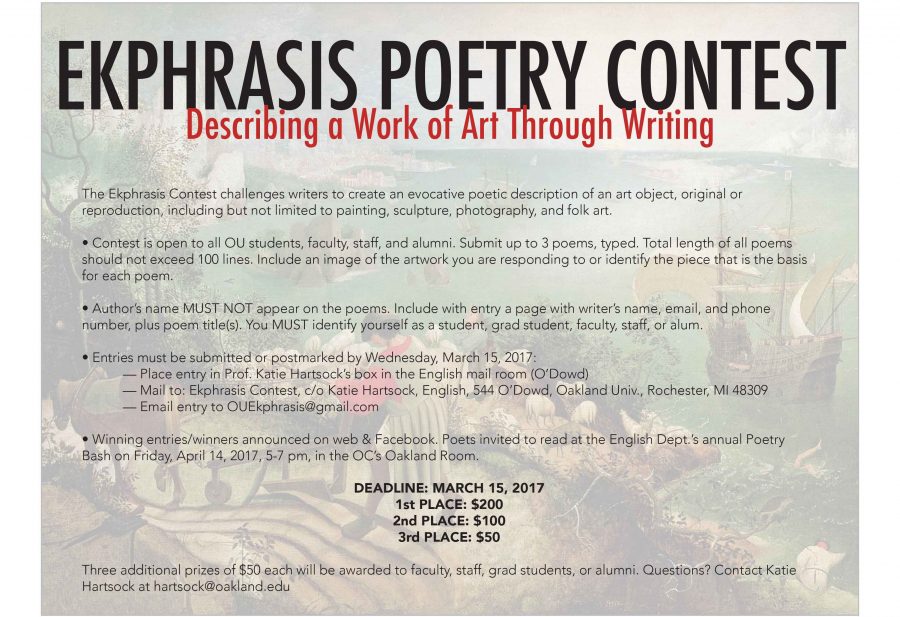English department to hold Ekphrasis Poetry Contest
Reading poetry — whether a Civil War poem by Walt Whitman, a romantic couplet or a foreboding piece by Edgar Allan Poe — can evoke a powerful emotional response. Writing poetry can also be a therapeutic experience that allows the writer to present a feeling or memory to others through the power of words.
Those who enjoy writing poetry can participate in the Oakland University Department of English’s Ekphrasis Poetry Contest.
“Ekphrasis is a mode of writing — which appears across all genres of writing, from poetry to fiction to literary nonfiction — which, simply, describes in words a visual work of art,” said Katie Hartsock, an English professor at OU. “This can be a painting or a sculpture or a photograph, religious icons or temple walls, even sophisticated housewares or weaponry, or anything we might call an ‘art object.’”
In other words, ekphrasis poetry is written in response to art.
Hartsock cited numerous examples of ekphrasis poetry, including W. H. Auden’s “Musee des Beaux Arts,” Michael Dumanis’ “Joseph Cornell, with Box,” John Keats’ “Ode on a Grecian Urn,” and Marianne Boruch’s “Little Wife.”
Hartsock said ekphrasis poetry has been around for centuries.
“In Homer’s ‘Iliad,’ the poet describes the shield of Achilles,” Hartsock said. “Most often poets imply how they interpret a work of art, or what it means to them personally, thus revealing a meaning they see already operating within the piece, or giving it a meaning it might not previously have had.”
The first-place winner of the Department of English’s contest will receive $200, while second and third place will receive $100 and $50, respectively.
The contest is available to students and alumni of all majors, as well as staff and faculty.
Contestants may submit up to three entries. The only requirements are that the total length of all three entries must be under 100 lines, the poems must be typed, and authors must include an image or other method of identifying what the poem is written in response to.
Also, a separate page including the author’s name, email, phone number and the title of the poem must be included with the submission.
“My advice to readers wanting to enter the contest is to pick a work of art with which you have a meaningful relationship, and let the unique meaning of that relationship come through in the poem, whether it’s interpretation, or revealing how the artwork has meant something important to you,” Hartsock said.
Natalie Cole, another English professor at OU, echoed Hartsock’s advice.
“My advice to students entering the ekphrasis contest is to choose to write about a work of art that you keep coming back to, and one that makes you think, that puzzles you or makes you wonder,” Cole said.
The deadline to enter the Ekphrasis Poetry Contest is March 15, 2017.
Entries may be emailed to [email protected] or placed directly in Katie Hartsock’s mailbox in the English department’s mailroom on the fifth floor of O’Dowd Hall.








dagmar hale • Oct 19, 2020 at 10:01 AM
need update about entering any Ekphrastic poetry contests. thank you